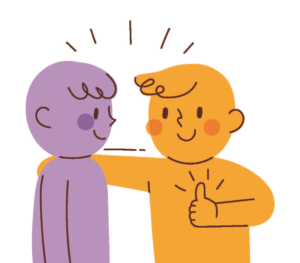How to Recover From a Friendship Breakup
Caroline Maguire, MEd, ACCG, PCC
Attention Magazine October 2022
Download PDF
You have to admit that being dumped hurts. It hurts that the friendship is over and it hurts to feel rejected. Every time you hear your phone ring or ping with a text message, you find yourself hoping that it’s your friend reaching out to make amends.
 Breaking up is hard to do at any age, whether a friend distances without an explanation (ghosting), actually asks to stop seeing you, or says it would take too much effort to rescue what’s left after an argument.
Breaking up is hard to do at any age, whether a friend distances without an explanation (ghosting), actually asks to stop seeing you, or says it would take too much effort to rescue what’s left after an argument.
Friendship can be especially hard for those of us with ADHD. Challenges with managing attention, hyperactivity, impulsiveness, and mood regulation often make it difficult to develop social skills.
We assume friendships will last forever, but like any relationship, they take hard work to make them healthy for both partners. Perhaps this friendship needed to end because it wasn’t healthy anymore. Rejection sensitivity (fear of being rejected) is all too common for people with ADHD. This fear may take hold of us, making it feel as if we deserve to be punished.
What to Do When Your Friendship Breakup Hurts
- Don’t assume it’s your fault.
Do you feel like you are the only one this happens to? Many people with ADHD struggle with relationship issues and often assume that the ending is their fault. Do not automatically accept the full brunt of the demise. People change, and needs change too, so a relationship ending does not mean you are at fault—or at least not 100% at fault. - Allow time to grieve.
Just as with any loss, you need to move through the stages of grief. Being cut off from someone who played an important role in your life can be crushing. If your former friend leaves you without answers, consider that it might be because of their inability to discuss uncomfortable issues. Even if you don’t know the reason for the breakup, you still need to grieve in order to move on. - Try to get clarity, but don’t chase answers.
For your own benefit, you may want to learn the reason(s) for what went wrong. This is fine; however, understand that the other party may not cooperate. For shorter-term friendships, the other person may just want to end it without dialogue. For longer-term relationships, you can apologize for a misunderstanding once, but don’t chase the person. We have a tendency to over-text and write long emails in order to understand every nuance. I recommend that you try to apologize, engage one last time, and then try to shift into the grieving process. - Is it me? What else could it be?
In a world of ghosting, social media, and distancing, its often hard to know why someone is no longer engaged with you. Check the story you are telling yourself. If you do not know the specific reason for the end of the friendship, you can make up a painful, shameful story on how it is all your fault, but without information you can’t honestly know the reason. Sometimes people’s issues have nothing to do with you. - End the rumination cycle.
Ruminating is natural, but rarely helpful. Allow yourself fifteen minutes a day to ruminate, then try to engage in a pattern interrupt to stop the ruminative cycle. Talking to a friend can be helpful too, but only if they don’t fall into the rumination cycle with you. - Learn from your mistakes.
Who hasn’t said something hurtful at least once? Do your best to learn from the mistake or misunderstanding in order to move forward. Life’s lessons rarely come easily, so use this experience as part of your tapestry of personal growth. Shake off feelings of shame, and instead work toward understanding societal norms and expectations and always treat others with kindness. - Work on skills so you can connect with others.
Engage in social skills activities that will help make building new connections easier. These activities involve communication and interaction and therefore they can help introduce you to new people. - Look at what you offer relationships.
Make a list of your positive attributes and strengths. Identify how you contribute—positively and negatively—to your current relationships. Which traits should you work more at, and which should you try to temper? - Diagnose what you want from relationships.
Evaluate how you want to be treated. Don’t only look at where you are, but also at where you want to be. It is said that we show people how we want to be treated. If you willingly accept insults and rudeness, it will continue. Hold your head up high and recognize that some relationships should be ended. - Connect with others.
As research demonstrates, connection is good for your physical and mental well-being, while isolation is not. Although you are saddened and grieving, allow yourself to reconnect with old friends and meet new folks. Nurture relationships and join activities and arenas to meet other like-minded people.
AFTER THE BREAKUP, take care of yourself. Spend time with people who are good for your health and happiness and who can reinforce all the great things about you. It’s also important to take care of your body and mind. Make yourself feel valuable: wash your hair, exercise, and journal. Your ultimate goal should be forgiveness. Work toward letting go of the negativity to make room for better experiences.
 Caroline Maguire, MEd, ACCG, PCC, holds a master’s degree with a specialization in social emotional learning from Lesley University. She is the author of Why Will No One Play with Me, an award-winning book designed to teach emotional regulation, social and self-awareness, and responsible decision-making skills. She founded the Fundamentals of ADHD Coaching for Families training program at the ADD Coach Academy, which is accredited by ICF. Visit her website, CarolineMaguireAuthor.com, follow her @AuthorCarolineM and download her free video, How to Tell a Tighter Story.
Caroline Maguire, MEd, ACCG, PCC, holds a master’s degree with a specialization in social emotional learning from Lesley University. She is the author of Why Will No One Play with Me, an award-winning book designed to teach emotional regulation, social and self-awareness, and responsible decision-making skills. She founded the Fundamentals of ADHD Coaching for Families training program at the ADD Coach Academy, which is accredited by ICF. Visit her website, CarolineMaguireAuthor.com, follow her @AuthorCarolineM and download her free video, How to Tell a Tighter Story.
ADDITIONAL READING/SOURCES
Cosslett, Rhiannon Lucy. “It Feels Like Having a Limb Cut Off,” in The Guardian, April 21, 2018. Retrieved December 22, 2018: https://www.theguardian.com/lifeandstyle/2018/apr/21/like-having-limb-cut-off-pain-friendship-breakups.
Holloway, Sadie. “Coping with Disappointment When a Friendship Ends” on PairedLife, December 5, 2016. Retrieved December 22, 2018: https://pairedlife.com/friendship/Pain-and-Disappointment-When-a-Friendship-Ends.
Levine, Irene S. Best Friends Forever: Surviving a Breakup with Your Best Friend. New York: Overlook Press, 2009.
Pryor, Liz. What Did I Do Wrong? When Women Don’t Tell Each Other the Friendship Is Over. New York: Free Press, 2006.
Thompson, Michael, and O’Neil, Catherine. Best Friends, Worst Enemies, Understanding the Social Lives of Children. New York: Ballantine Books, 2001.
Other Articles in this Edition
LW4K: Turning Game-Based Learning into Executive Function and Social-Emotional Learning Skills
Is Doing Household Chores Related to Executive Functioning?
How to Recover From a Friendship Breakup
“Everyone’s So Tense All the Time”
Building Better Homework Habits
The Transition to College Starts Today
Think You Can Spot ADHD in Your Classroom?
How to Build and Maintain New Habits
How Would a Professional Approach Treating an Adult with ADHD?
